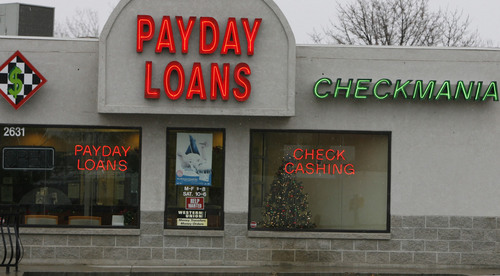This is an archived article that was published on sltrib.com in 2014, and information in the article may be outdated. It is provided only for personal research purposes and may not be reprinted.
By more than a 2-to-1 margin, a new poll shows that Utahns favor more state regulation of payday lenders — who charge an average 474 percent annual interest on loans.
That comes as House investigators reported payday lenders quietly financed misdeeds that helped lead to the resignation of former Attorney General John Swallow, including secretly funneling money to defeat a lawmaker who tried to more closely regulate the industry.
A SurveyUSA poll for The Salt Lake Tribune found that 58 percent of Utahns favor more regulation of the industry, 25 percent oppose it and 17 percent are unsure.
"Essentially, they rob people," said Kearns resident Glenn Larsen, one of those polled who would like to see more regulation. "The interest is outrageous. People who are desperate and are having financial problems take out the loans, and find they can never get out of the cycle of repaying them."
Larsen said he once helped an employee who was trapped by such loans pay them. "But getting that money was so easy that he went back again and got more loans. He ended up in bankruptcy."
Former Rep. Brad Daw, R-Orem, in 2012 pushed a bill that would have banned payday lenders from making loans to people who already have one, seeking to reduce the likelihood that they borrow more than they can repay. It would have created a database of loans that lenders would need to check before issuing additional loans. It failed amid opposition that Daw called "visceral."
House investigators said that Swallow's campaign staff set up nonprofit groups that by law did not need to disclose their donors. They were used to funnel hundreds of thousands of dollars from payday lenders to defeat Daw, and also help Swallow defeat his primary opponent, Sean Reyes, who later was appointed to replace Swallow.
Investigators say the money funded dozens of different mailers sent to voters attacking Daw without revealing who was behind them; "push polling" — a phone campaign masquerading as a survey using unflattering descriptions — against him; and $2,000 worth of campaign signs for his opponent.
"The results [of the poll] are completely unsurprising to me," Daw said, noting that questionnaires he previously sent to voters had "results that were always about the same."
Daw added, "I have improved hopes that something will finally be done," he said. "I'm glad to hear that people in Utah feel it's high time" to pass more regulation of payday loans.
Rep. Larry Wiley, D-West Valley City, this year is pushing legislation similar to Daw's previous bills, and is cheered by the new poll. "I'm glad the general population is looking at this and thinks that more probably needs to be done."
But David Parkinson, spokesman for the Utah Consumer Lending Association of payday lenders, said increased industry regulation won't help anyone.
"Onerous misregulation of the payday lending industry — such as that currently proposed in the 2014 Utah legislative session — will threaten the Utah payday industry," Parkinson said, "and force consumers to use unregulated offshore lenders."
He said Utah payday lenders already are heavily regulated, with such provisions as giving consumers a right to rescind a loan within 24 hours; allowing a borrower to stop the interest on one payday loan annually and pay it over two months with no additional fees; and requiring lenders to provide verbal disclosure of the terms.
Most customers are satisfied, Parkinson said. "In November 2013, a Harris Interactive poll found that nine in 10 payday loan borrowers were highly satisfied, valued the service and preferred payday loans over existing alternatives."
Parkinson said there's a legitimate and beneficial role for payday lenders.
"By providing access to short-term loans that banks, credit unions and other financial institutions can't provide, payday loans give these borrowers far better, less expensive options than overdrafts, bad check charges and utility disconnect/reconnect fees."
Annual state reports say the average payday loan in Utah is now for $358, and charges an average 473.52 percent annual interest rate. The loans can be renewed for up to 10 weeks, after which state law prohibits continuing to add interest. But people sometimes take out new loans to avoid overdraft fees on checks issued to secure the original loan.
The SurveyUSA poll interviewed 600 Utah adults between Jan. 10-13. Its sampling error was plus or minus 4 percent.



